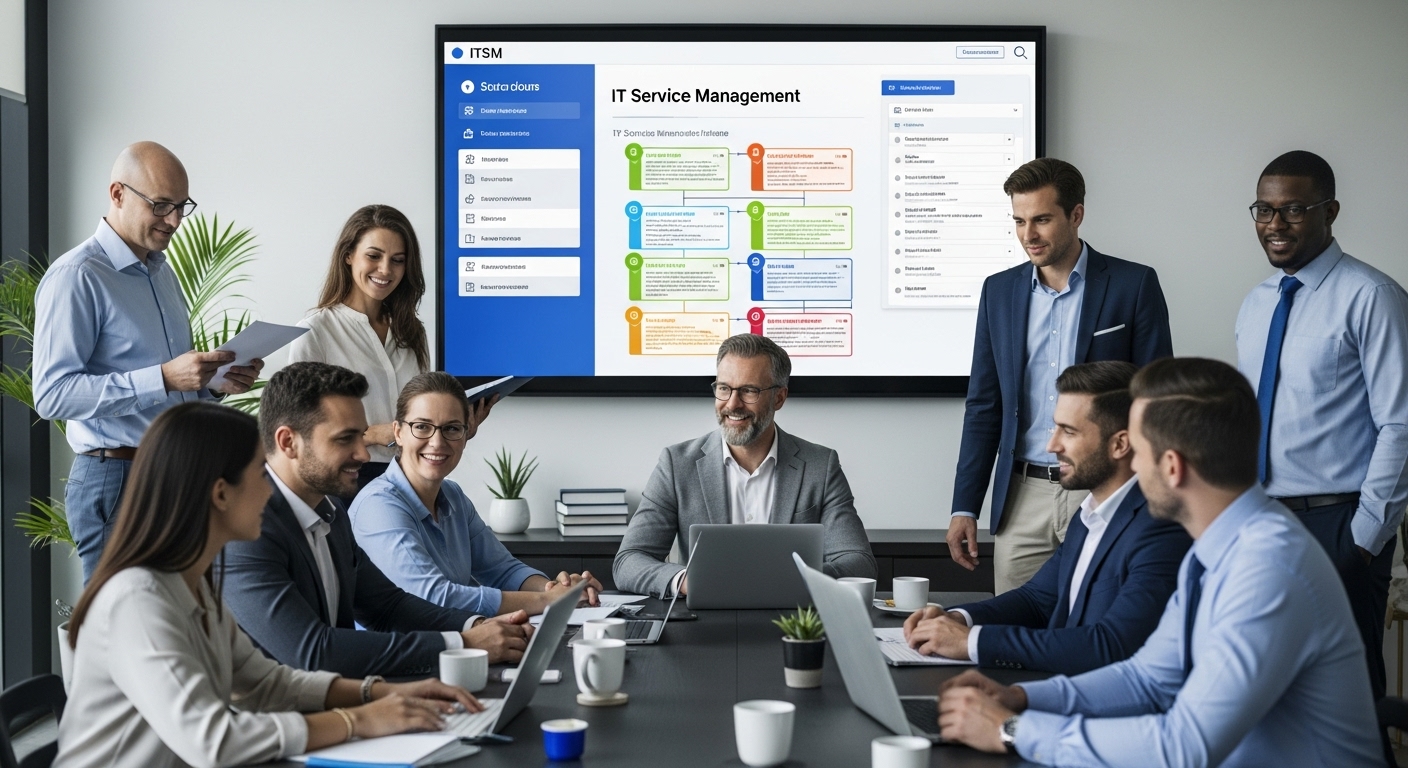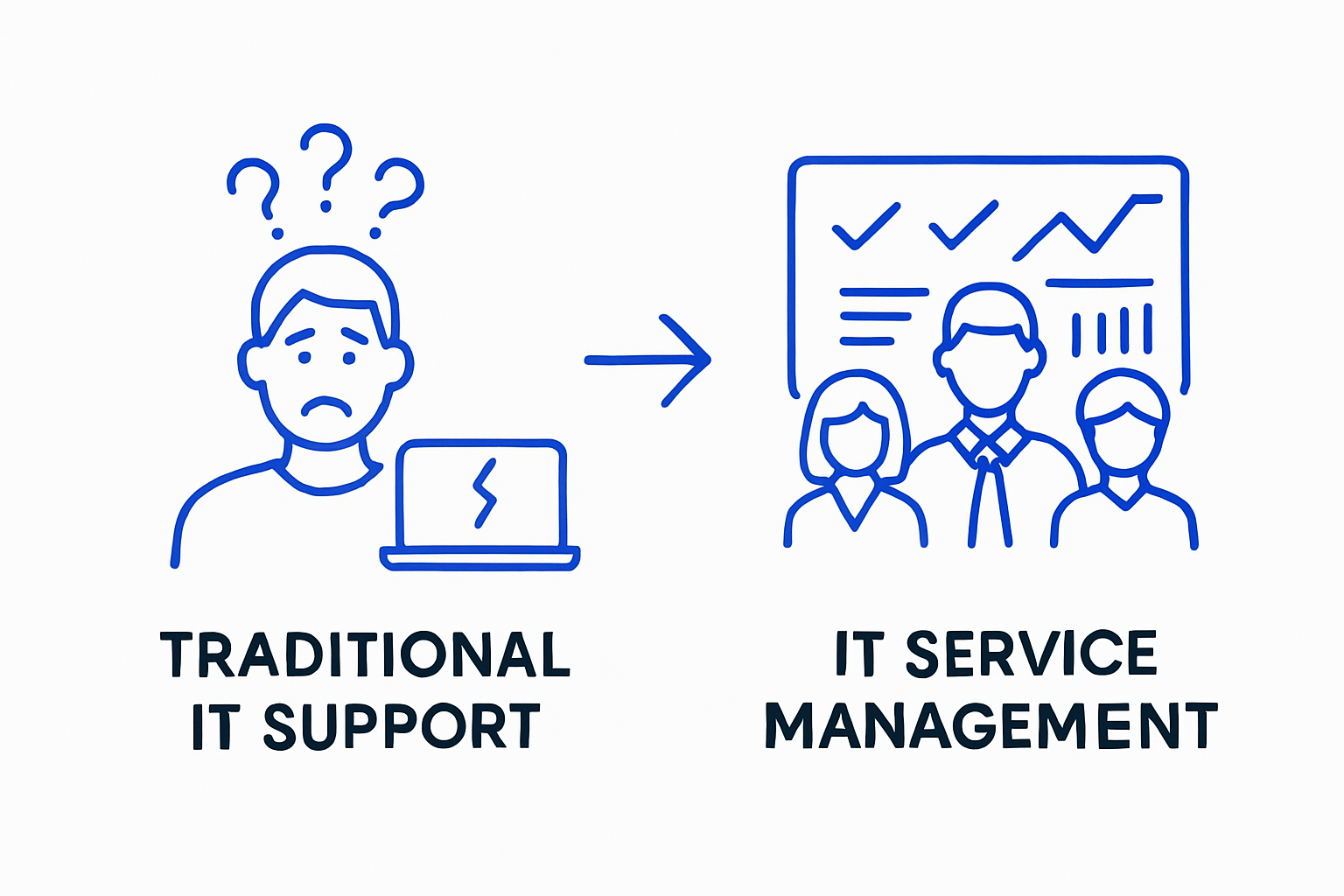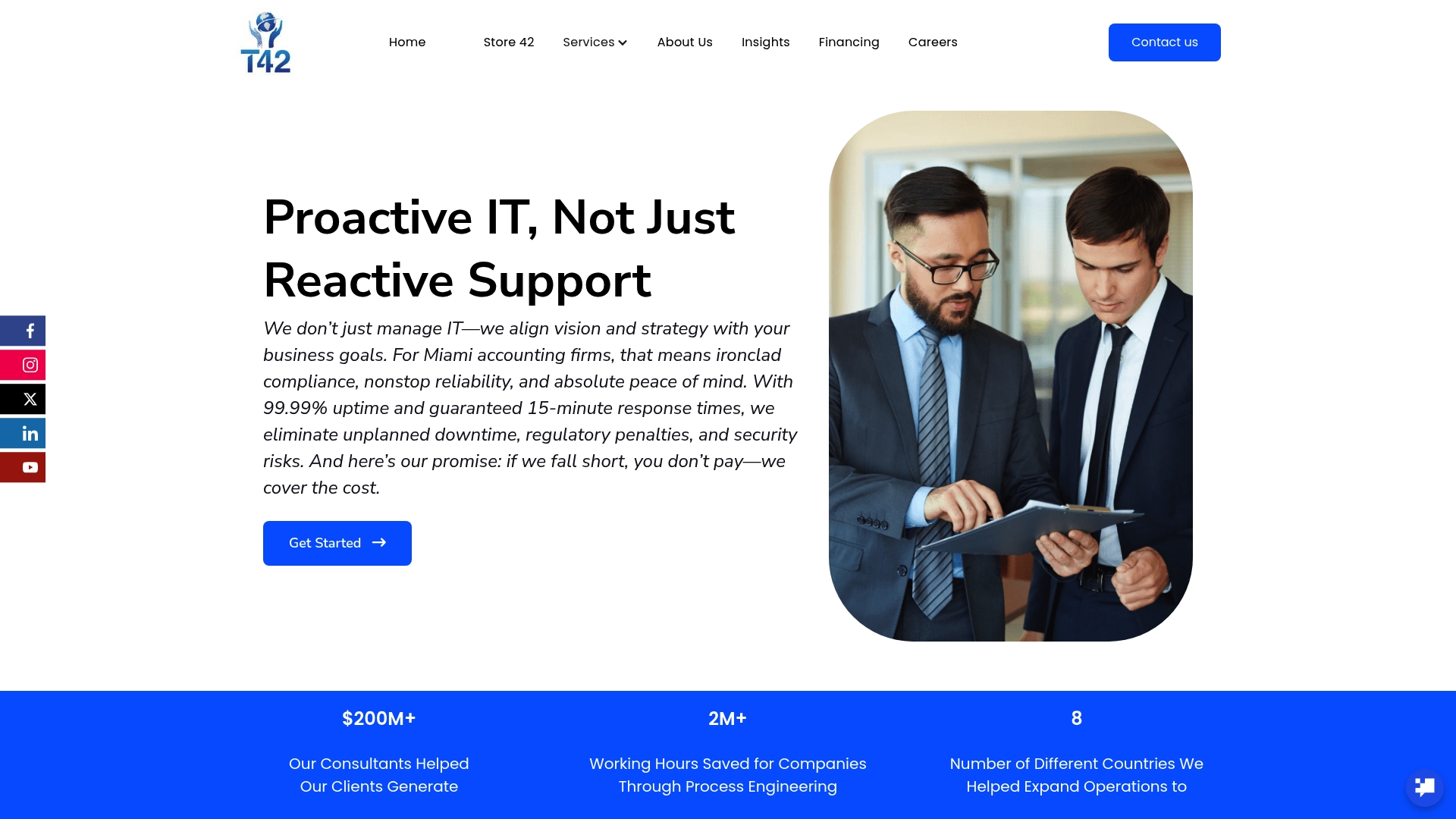
Accounting firms once treated technology as an afterthought. Now, just one tech vulnerability can put every client’s financial secrets at risk. Surprising as it sounds, the real game changer for these firms is not just having IT support but using IT Service Management to turn technology into their most trusted ally.
TakeawayExplanationITSM transforms technology into a strategic assetIT Service Management shifts technology from being reactive to playing a crucial, proactive role in achieving organizational goals.Enhances data security and complianceITSM enables firms to implement robust security measures and maintain compliance with strict regulatory requirements essential for protecting sensitive client information.Promotes operational efficiency through automationBy automating routine tasks, accounting firms can improve resource allocation, reduce errors, and focus on strategic activities that enhance service delivery.Improves client communication and service qualityITSM establishes clear communication protocols, ensuring clients receive timely updates and support, thus fostering stronger client relationships.Drives continuous improvement in technology servicesOngoing assessment and enhancement of IT systems enable firms to remain agile and responsive to evolving technological and client needs.
IT Service Management represents a strategic approach that helps accounting firms and professional services organizations effectively manage their technology infrastructure, support processes, and delivery of technological solutions. Unlike traditional tech support models, ITSM focuses on creating a comprehensive framework that aligns technological capabilities with specific business objectives.
At its foundation, IT Service Management is about transforming technology from a reactive support function into a proactive, strategic business partner. For Miami accounting firms navigating complex regulatory environments and handling sensitive financial data, ITSM provides a structured methodology to ensure technology consistently meets organizational needs.
The framework encompasses several critical components that distinguish it from traditional IT support:

Accounting practices today rely heavily on technology for everything from client management to secure data processing. According to research from the National Institute of Standards and Technology, ITSM helps organizations design, deliver, and improve IT services to meet precise business requirements.
For accounting firms, this means more than just fixing computer problems. ITSM enables technology to become a strategic asset that enhances operational efficiency, reduces downtime, and provides a reliable platform for serving clients effectively. By implementing robust ITSM practices, firms can:
The ultimate goal of IT Service Management is transforming technology from a cost center into a value-generating component of business strategy. For accounting professionals, this translates into smoother operations, enhanced client trust, and the ability to focus on core financial expertise rather than wrestling with technological challenges.
To clarify the differences between reactive IT support and proactive IT Service Management (ITSM) emphasized in the article, the table below compares key characteristics of each approach and their impact on accounting firms.
AspectReactive IT SupportProactive IT Service Management (ITSM)ApproachFix problems after they occurPrevent issues and align with business goalsFocusIndividual incidentsOverall service quality and reliabilityRole in FirmCost center, tech troubleshootingStrategic asset, driver of operationsData SecurityBasic protective measuresStructured, multi-layered protocolsComplianceAddress compliance as issues ariseBuilt-in, audit-ready processesClient ExperienceInconsistent, reactive supportReliable, transparent, and responsiveImprovement CycleOccasional upgradesOngoing assessment and continuous improvement
In the high-stakes world of accounting and financial services, technology isn’t just a tool - it’s the backbone of operational excellence. For CPA firms in Miami and beyond, IT Service Management (ITSM) has transformed from an optional strategy to a critical business imperative that directly impacts client trust, regulatory compliance, and competitive advantage.
CPA firms handle some of the most confidential information imaginable - tax records, financial statements, personal client details. One technological vulnerability can compromise entire client portfolios. ITSM provides a structured approach to cybersecurity that goes far beyond traditional protective measures.
The risks are substantial. Financial data breaches can result in:
Accounting firms operate under extremely strict regulatory frameworks. According to research from the American Institute of CPAs, technology management is no longer optional but a fundamental requirement for maintaining professional standards.
Effective ITSM helps CPA firms:
Beyond risk management, ITSM enables CPA firms to transform technology from a cost center into a strategic asset. By standardizing service delivery, firms can reduce downtime, streamline client interactions, and allocate resources more intelligently.
The result is a more agile, responsive accounting practice that can adapt quickly to changing client needs and technological landscapes. For Miami’s competitive accounting ecosystem, this isn’t just an advantage - it’s a necessity for survival and growth.
IT Service Management frameworks are intricate systems designed to transform technological infrastructure from a reactive support function into a strategic business asset. For accounting firms, these frameworks represent a comprehensive approach to managing technology that goes beyond simple troubleshooting.
Strategic planning forms the foundation of effective ITSM frameworks. This initial phase involves carefully mapping technological capabilities to specific business objectives. For Miami accounting firms, this means creating technology solutions that directly support financial reporting, client data management, and regulatory compliance.
The strategic planning process typically includes:
Operational management represents the day-to-day execution of IT service strategies. According to research from the University of California, Berkeley, this component focuses on creating robust support mechanisms that ensure continuous, reliable technological performance.
Key operational management practices include:

The most sophisticated ITSM frameworks recognize that technology is not static. Continuous improvement becomes a critical ongoing process that allows organizations to remain agile and responsive to emerging technological challenges.
This approach involves regular assessment of existing systems, identifying potential improvements, and implementing incremental enhancements. For accounting firms, this means constantly refining technological capabilities to maintain competitive advantage, improve client service, and stay ahead of potential security risks.
By integrating these components, ITSM frameworks transform technology from a simple support function into a strategic partner that drives organizational success.
This table summarizes the primary components of an IT Service Management (ITSM) framework as outlined in the article, highlighting their specific roles and importance for accounting firms.
ITSM ComponentPurposeImportance for Accounting FirmsStrategic Planning & Service DesignMap technology to business objectives, design effective solutionsSupports compliance, reporting, and client managementOperational Management & SupportExecute daily IT operations and resolve incidentsEnsures reliability, rapid problem resolutionContinuous Improvement & AdaptationRegularly assess and enhance IT systems to stay currentMaintains agility, addresses new risks and requirements
For accounting firms, client service is not just about number crunching - it’s about delivering reliable, secure, and responsive technological experiences that instill confidence and trust. IT Service Management (ITSM) plays a crucial role in transforming technological interactions from potential frustrations into seamless, value-added experiences.
Effective communication is the cornerstone of exceptional client service. ITSM frameworks establish clear, structured communication protocols that ensure clients receive timely, transparent updates about their technological support needs. For Miami accounting firms, this means creating predictable, reliable channels of interaction that reduce uncertainty and build long-term client relationships.
Key communication enhancements include:
Accounting firms handle extraordinarily sensitive financial information. According to research from the American Institute of CPAs, technological infrastructure must provide robust security mechanisms that go beyond basic protection.
ISM frameworks help firms:
Today’s clients expect sophisticated, user-friendly digital interactions. ITSM transforms technological platforms from potential barriers into smooth, intuitive service channels. By standardizing service delivery and creating consistent user experiences, accounting firms can differentiate themselves through technological excellence.
This approach means developing technological ecosystems that are:
Ultimately, ITSM is about creating technological environments that feel effortless, secure, and aligned with client expectations - turning potential technological friction into a competitive advantage.
IT Service Management transcends theoretical frameworks, becoming a practical toolkit that transforms how accounting firms operate in an increasingly digital landscape. For Miami-based accounting practices, ITSM is not just a technological strategy but a critical business enabler that drives efficiency, compliance, and client satisfaction.
Automation stands at the forefront of ITSM applications in accounting. By implementing sophisticated technological frameworks, firms can eliminate repetitive manual tasks, reduce human error, and allocate professional resources to more strategic activities. This approach fundamentally reshapes how accounting services are delivered.
Key automation opportunities include:
Accounting firms operate in a complex regulatory environment where technological precision can mean the difference between compliance and costly penalties. According to research from Deloitte, ITSM provides robust mechanisms for maintaining meticulous records and ensuring regulatory adherence.
Compliance enhancement strategies involve:
ITSM transforms raw data into actionable business intelligence. By creating integrated technological ecosystems, accounting firms can generate sophisticated insights that drive strategic decision-making. This goes beyond traditional reporting, offering predictive analytics and comprehensive performance visualization.
Data-driven capabilities include:
Through these real-world applications, ITSM empowers accounting firms to move beyond traditional service models, becoming agile, technologically sophisticated partners in their clients’ financial journeys.
Miami accounting firms face constant pressure to secure client data, keep up with regulatory changes, and eliminate any hint of downtime. The article highlights why reactive IT simply is not enough. Your team deserves strategic IT Service Management that guarantees reliability, process improvements, and relentless support every hour of every day. Take back control from unexpected disruptions. Protect your firm’s reputation and build trust with clients by making your technology a business asset, not just a support function.

Ready to leave unplanned downtime and compliance fears behind? Discover how our expert solutions at Transform42 Inc. deliver 99.99 percent uptime and a rapid 15-minute response time—so you can focus on your clients, not your computers. We are so confident in our proactive approach to IT Service Management that if we do not deliver, we cover the cost.
Act now to experience a seamless transition from stressed to secure. Visit our homepage to schedule your free consultation and see why Miami’s leading accounting firms trust us to keep them compliant and ahead of the curve.
IT Service Management (ITSM) is a framework that helps organizations manage their IT services effectively. It focuses on aligning technology with business objectives rather than just providing reactive tech support.
ITSM is important for accounting firms because it helps minimize technological disruptions, ensure data security, and optimize resource allocation, transforming technology from a cost center into a strategic asset.
ITSM enhances cybersecurity by providing structured approaches to protecting sensitive financial data, implementing robust data protection protocols, and ensuring audit-ready technological infrastructures that comply with regulatory requirements.
The key components of an ITSM framework include strategic planning and service design, operational management and support, and continuous improvement. These elements work together to transform technology into a partner that drives organizational success.